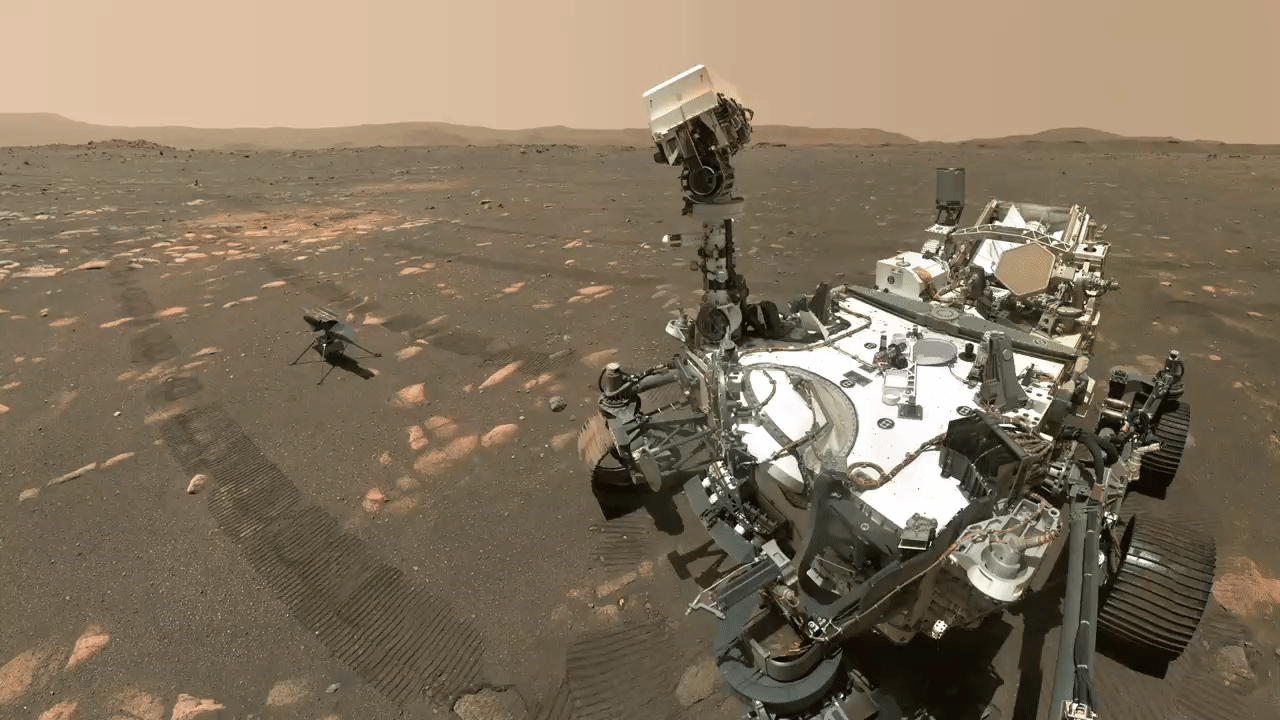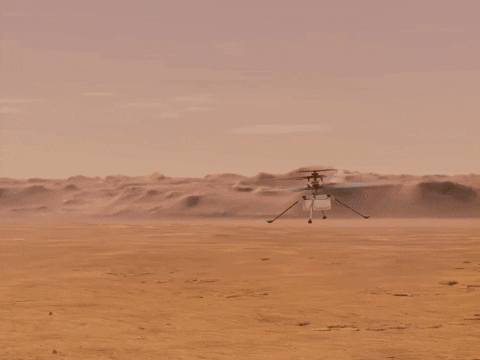New Week Same Humans #30
The chit-chat economy is a powerful new trend for the 2020s. NASA prepares for a historic first on Mars. Plus more news and analysis from this week.
Welcome to the mid-week update from New World Same Humans, a newsletter on trends, technology, and society by David Mattin.
If you’re reading this and you haven’t yet subscribed, then join 16,000+ curious souls on a journey to build a better shared future 🚀🔮
💡 This week’s Sunday essay examined the uneasy relationship between technology, climate, and politics. Go here to read: Is More Technology Really the Answer to the Climate Crisis? 💡
This week, why empowering knowledge workers to share chit-chat is a huge opportunity for innovators in the coming decade.
Also, NASA’s Perseverance Mars rover takes a selfie. And the UK enjoys its greenest ever day.
Plus: the Soviet-era TV version of Lord of the Rings that’s blowing minds all over the world.
Let’s go!
🧑💻 Welcome to the chit-chat economy
A new study published this week found that one in three US workers say they’d quit if required to return to the office full time.
Global staffing firm Robert Half surveyed over 1,000 employees at a range of companies; 49% said they favoured a hybrid work model, while 26% would prefer to be fully remote.
Meanwhile, an article in the Harvard Business Review stressed the importance of impromptu, informal office small talk when it comes to employee motivation and creativity. It turns out that organisational culture, and a whole lot of innovation, depends on this kind of spontaneous chit-chat.
A recognition of those truths may help explain why early enthusiasm among tech employers for remote or hybrid working now seems to be waning.
Google’s new Chief People Officer, Fiona Cicconi, this week wrote to staff to say the company would accelerate its timetable for bringing people back to the office; after 1 September, Googlers who want to work from home for more than 14 days per year will have to seek permission. Amazon also wrote to staff and told them that physical presence means better invention, collaboration and learning: ‘our plan is to return to an office-centric culture as our baseline.’
⚡ NWSH Take: The evidence from 2020 is clear: remote knowledge workers maintained productivity, but innovation and creativity declined. // This shouldn’t be a surprise. It’s long been known that informal, multi-directional communication – otherwise known as small talk – plays a crucial role in organisational creativity and innovation: new ideas smash into one another, people play with the implications, and occasionally a great idea emerges. The problem? Remote workers typically only speak to each other in meetings; not the same thing at all. // As we shift to hybrid work, then, a powerful question is emerging for businesses: how do we encourage spontaneous small talk when our people work remotely? // This is a huge deal. Businesses depend on innovation for survival. Top talent will now refuse to attend an office full time. Boardrooms will demand a solution to the innovation problem. Expect a whole host of startups to start working on serendipity machines that use AI, human curation, or both, to match employees for quick and (non)spontaneous online chats.
🪐 Life on Mars
NASA’s Perseverance rover has deployed a helicopter called Ingenuity.
The tiny craft, which weights just 1.8kg, will soon undertake the first ever powered flight on an alien planet. NASA say the flight will happen no earlier than Sunday; and yes, it will be livestreamed.
In the meantime, here are Perseverance and Ingenuity in a selfie – taken using a robot arm attached to the former – straight from the surface of the Red Planet.
Sometimes there’s no option but to be Full Spectrum Amazed.
🔌 Great energy
Biden’s $2 trillion climate and infrastructure programme will sever US government support for the fossil fuel industry.
That means no more subsidies, tax loopholes, and legal get-outs that leave Big Energy free to pollute without paying for the clean up. Advocacy group Oil Change International estimate the government sent $20.5 billion in subsidies to the oil and gas industries in 2016.
Meanwhile, the UK’s electricity operator, the National Grid, said that Easter Monday saw the country’s greenest ever energy moment. Sunny and windy weather meant that 80% of the UK’s electricity needs were met by low-carbon energy sources.
The UK has cut carbon emissions faster than any other rich country; they’re down 44% since 1990. Across that period, the economy has grown by two-thirds.
⚡ NWSH Take: In this week’s Sunday instalment I wrote about rising tension between those who believe technology – including solar and wind energy – can solve the climate crisis, and those who say only planned economic degrowth can save us from catastrophic warming. // The UK’s success on emissions is a win for those who believe in technology; but it’s come mainly via a move away from old-fashioned coal-burning power stations. Now that’s done the country will find it harder to make progress, leaving the door open for degrowthers to argue their case. // Meanwhile, Biden wants to pour $1 trillion into clean energy and transport across the next eight years. That’s more than the entire post-2009 crash Obama stimulus. Alexander Ocasio-Cortez and other Green New Dealers want more; $10 trillion across 10 years. // But no mainstream figure – in the US or UK – is even close to arguing for degrowth. Don’t think, though, that the idea will always remain on the radical fringe. Not so long ago, people said the same about the Green New Deal.
🗓️ Also this week
📖 Tencent’s massive ebook platform Webnovel is expanding into the US. Webnovel hosts self-published fiction, and already features 200,000 English-language titles including fantasy adventures I Am Loaded With Passive Skills and Pirate Harem System. Observers say Tencent want to leverage the IP on Webnovel to create original movies and TV shows.
🧠 Scientists connected a human brain to a computer wirelessly for the first time. Researchers at Brown University connected a small transistor to the motor cortex of trial participants with paralysis, who were then able to control a tablet computer using thought alone.
🙋 Yahoo announced that Yahoo Answers will shut down next month. It marks the end of one of the internet’s weirdest corners.
⚖️ The UK government launched a new watchdog to oversee Big Tech. The Digital Markets Unit will be able to fine tech companies that break competition and data privacy rules.
🎸 A charity used Google’s Magenta AI to generate ‘new’ songs by Nirvana, Amy Winehouse, and Jimi Hendrix. Over The Bridge want to raise awareness of poor mental health among musicians.
📍 Google Maps is adding augmented reality features to help users navigate in shared indoor spaces. Live View will display AR directions in malls, airports, and sports stadia.
💰 A new study says Bitcoin mining may undermine China’s push to meet clean energy targets. Writing in the journal Nature, scientists say China powers nearly 80% of the global trade in cryptocurrencies.
🎤 Payment service Stripe is partnering with the audio social network Clubhouse to allow creators to receive tips. Users will be able to pay creators inside the app, and Clubhouse won’t take a cut.
🤖 The French army is testing Boston Dynamic’s robot dog Spot for battlefield use. Boston Dynamics say they were not given advance warning of the tests.
🧙 A long-lost 1991 TV version of The Lord of the Rings from Soviet Russia has set the internet on fire. Russian channel 5TV unearthed the series – best described as Tolkein meets psychedelia – and uploaded it to YouTube; Part 1 has had 1.4 million views.
🌍 Humans of Earth
Key metrics to help you keep track of Project Human.
🙋 Global population: 7,857,526,914
🌊 Earths currently needed: 1.7816537336
💉 Global population vaccinated: 1.9%
🗓️ 2021 progress bar: 27% complete
📖 On this day: On 9th April 1957 the Suez Canal opened to shipping following the five-month Suez Crisis.
Self Belief
NASA’s Perseverance rover has pulled off the coolest use of a selfie stick ever.
I can’t wait to see Ingenuity take to the Martian skies. NASA have even made an animation to help build the excitement:
To bide the time between now and launch day, there’s one thing you can do to help our growing community: share!
Now that you’ve made it to the end of this week’s instalment, please consider forwarding the email to someone who’d also enjoy it. Or share it across one of your social networks, with a note on why you found it valuable. Remember: the larger and more diverse the NWSH community becomes, the better for all of us!
I’ll be back on Sunday. Until then, be well,
David.
P.S Thanks to Monique van Dusseldorp for additional research and analysis.





